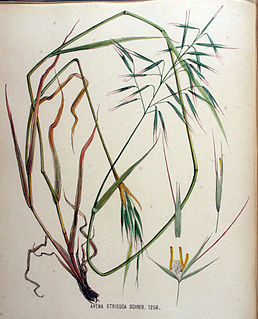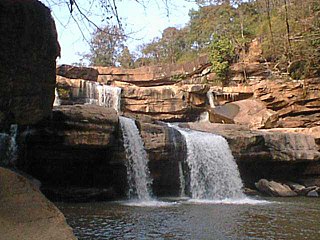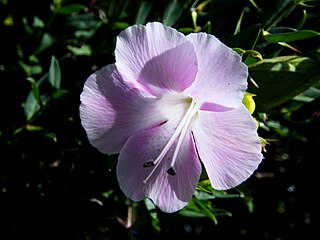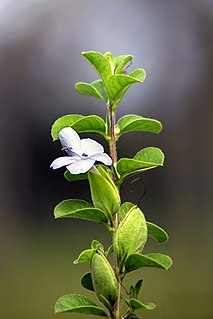
Barleria is a genus of plants in the family Acanthaceae.

Barleria cristata, the Philippine violet, bluebell barleria or crested Philippine violet, is a plant species in the family Acanthaceae.

Avena strigosa is a species of grass native to Europe, and its seeds are edible. This plant is often cultivated as animal feed in the south Brazil, and it is sometimes reported as a weed.
Barleria opaca is a shrub in the botanical family Acanthaceae.

A Specimen of the Botany of New Holland, also known by its standard abbreviation Spec. Bot. New Holland, was the first published book on the flora of Australia. Written by James Edward Smith and illustrated by James Sowerby, it was published by Sowerby in four parts between 1793 and 1795. It consists of 16 colour plates of paintings by Sowerby, mostly based on sketches by John White, and around 40 pages of accompanying text. It was presented as the first volume in a series, but no further volumes were released.
Barleria observatrix is a species of plant in the family Acanthaceae. It is endemic to Mauritius. Its natural habitat is subtropical or tropical dry forests.

Thung Salaeng Luang National Park is a 1,262 km2 (487 sq mi) national park in Phitsanulok and Phetchabun Provinces of Thailand. It encompasses substantial portions of Wang Thong and Lom Sak Districts.

Lissanthe is a genus of shrubs in the family Ericaceae. The genus is endemic to Australia.

Barleria prionitis is a shrub in the family Acanthaceae, native to Island and Mainland Southeast Asia, China, the Indian Subcontinent, the Arabian Peninsula and northeastern Africa. It is widely spread as an ornamental and weed, occurring in naturalised populations around the world. It used not only as an ornamental but also as a hedge and extensively as a component of folk medicines. As a weed it is regarded as problematic in many areas.

Dialectica scalariella is a moth of the family Gracillariidae. It is found from France to the Iberian Peninsula, Italy and the Balkan Peninsula. Recently an imago was found in Great Britain. It was introduced in Australia for the biological control of the weed Echium plantagineum and has since spread to New Zealand.

Centrolepis strigosa, commonly known as hairy centrolepis, is a species of plant of the Restionaceae family. It is found in New Zealand. and Australia

Lissanthe strigosa, sometimes referred as the peach heath, is a common shrub from the heath family, found in eastern and southern Australia.

Barleria greenii, is a plant in the family Acanthaceae. It is endemic to a small area near Estcourt in KwaZulu-Natal, South Africa.

Barleria albostellata, the grey barleria, is a plant species in the family Acanthaceae. It occurs in subtropical woodland areas of South Africa and Zimbabwe.

Barleria mysorensis, a plant species within the genus Barleria of the family Acanthaceae. It is widely used as an ayurvedic plant in India and Sri Lanka. In Sri Lanka, it is known as "Katu Nelu".
Caladenia strigosa is a plant in the orchid family Orchidaceae and is endemic to South Australia. It is a ground orchid with a single leaf and a single greenish-cream flower with fine reddish streaks. It grows in sandy soil in shrubland.
Barleria elegans is a species of plants in the family Acanthaceae. It is found in South Africa.

Anchusa strigosa is a non-succulent species of herbaceous plants in the Boraginaceae family endemic to the Eastern Mediterranean regions, particularly, Greece, Turkey, Lebanon, Israel, and Jordan, as far as Iran. It is known widely by its common names of strigose bugloss and prickly alkanet.
















